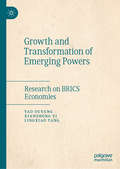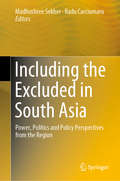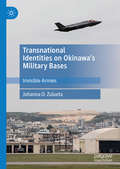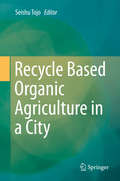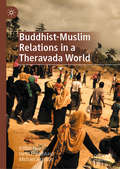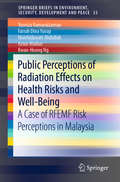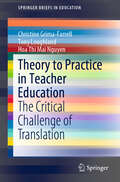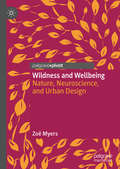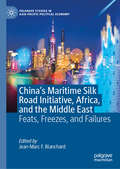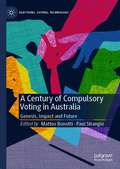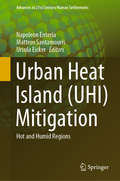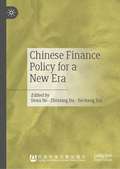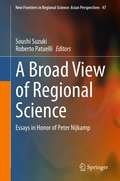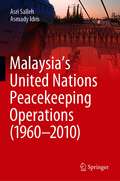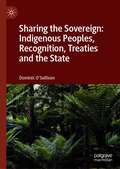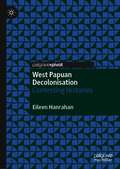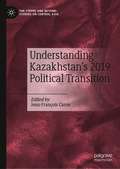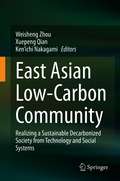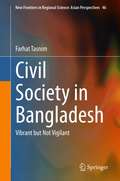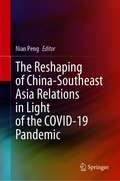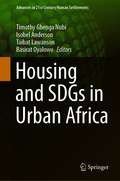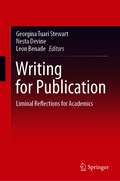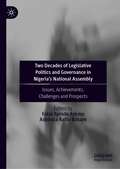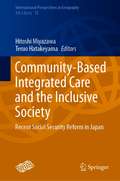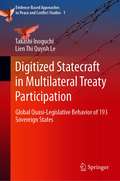- Table View
- List View
Growth and Transformation of Emerging Powers: Research on BRICS Economies
by Yao Ouyang Xianzhong Yi Lingxiao TangThis book offers a quantitative and qualitative look at the much-discussed BRICS—Brazil, Russia, India, China and South Africa—and explores how their economic ascent might cause global economic realignments in the 21st century. Providing a Chinese perspective on how the global realignment might impact strategic choices and a data-driven approach to the similarities and differences within the so-called BRICS group, this book will be of great interest to economists, international banking professionals, and political forecasters.
Including the Excluded in South Asia: Power, Politics and Policy Perspectives from the Region
by Madhushree Sekher Radu CarciumaruThis book analyses and discusses the multiple dimensions of social exclusion/inclusion seen in South Asia. It not only captures how ‘social exclusion’ is intrinsic to deprivation or deprivation in itself, but also the processes of political engagement and social interactions that the socially excluded develop as strategies and networks for their advancement. Consequently, the book goes beyond structures or agency, and examines the question of a more dynamic approach to provide spaces for the ‘socially excluded’ to self-manage exclusion, thereby raising discussions around the contested positions that underlie development discourse on social inequality.While social exclusion linked to identities is studied, the book argues that hierarchies and inequalities based on social identities cut across and affect various groups of excluded. Consequently, these phenomena create or lead to various processes of exclusion. The book illustrates that social exclusion should not be limited to privileging the differences that characterize the exclusionary processes, but should also comprise underpinning strategies of ‘inclusion’, emphasizing the need to focus on imperatives ‘to include’. As a result, the book acknowledges that social exclusion is not limited to analyzing the different identities that face exclusion, but also understanding the systems and processes that create social exclusion, or create opportunities for inclusion of the excluded.The book addresses readership across academic disciplines (including in the growing field of state capacity and governance), and practitioners (administrators and policy-making communities). Conclusively, the book, provides a platform to intensively exchange the multifaceted and critical issue of social exclusion/inclusion, and thus contributes to inclusive sustainable development discourse.
Transnational Identities on Okinawa’s Military Bases: Invisible Armies
by Johanna O. ZuluetaThis book considers the role of civilian workers on U.S. bases in Okinawa, Japan and how transnational movements within East Asia during the Occupation period brought foreign workers, mostly from the Philippines, to work on these bases. Decades later, in a seeming “reproduction of base labour”, returnees of both Okinawan and Philippine heritage began occupying jobs on base as United States of Japan (USFJ) employees. The book investigates the role that ethnicity, nationality, and capital play in the lives of these base employees, and at the same time examines how Japanese and Okinawan identity/ies are formed and challenged. It offers a valuable resource for those interested in Japan and Okinawa, U.S. military basing, migration, and mixed ethnicities.
Recycle Based Organic Agriculture in a City
by Seishu TojoThis book highlights the significance of urban agricultural production, the technologies and methods for supplying organic materials to the farmland, recovering plant nutrients and energy in cities, and systems for sustaining farmlands in order to produce agricultural crops and supply safe food to citizens. Focusing on the effective recycling of biomass waste generated in cities for use in organic farming, it discusses alternatives to traditional composting, such as carbonizing organic waste, which not only produces recyclable materials but also converts organic waste into energy. Recycling discarded organic matter appropriately and reusing it as both material and energy is the basis of new urban organic farming, and represents a major challenge for the next generation of urban agriculture. As such, the book presents advanced research findings to facilitate the implementation of safe, organic agricultural production with only a small environmental load.
Buddhist-Muslim Relations in a Theravada World
by Iselin Frydenlund Michael JerrysonThis book is the first to critically analyze Buddhist-Muslim relations in Theravada Buddhist majority states in South and Southeast Asia. Asia is home to the largest population of Buddhists and Muslims. In recent years, this interfaith communal living has incurred conflicts, such as the ethnic-religious conflicts in Myanmar, Sri Lanka, and Thailand. Experts from around the world collaborate to provide a comprehensive look into religious pluralism and religious violence. The book is divided into two sections. The first section provides historical background to the three countries with the largest Buddhist-Muslim relations. The second section has chapters that focus on specific encounters between Buddhists and Muslims, which includes anti-Buddhist sentiments in Bangladesh, the role of gender in Muslim-Buddhist relations and the rise of anti-Muslim and anti-Rohingya sentiments in Myanmar. By exploring historical fluctuations over time—paying particular attention to how state-formations condition Muslim-Buddhist entanglements—the book shows the processual and relational aspects of religious identity constructions and Buddhist-Muslim interactions in Theravada Buddhist majority states.
Public Perceptions of Radiation Effects on Health Risks and Well-Being: A Case of RFEMF Risk Perceptions in Malaysia (SpringerBriefs in Environment, Security, Development and Peace #33)
by Yusniza Kamarulzaman Farrah Dina Yusop Noorhidawati Abdullah Azian Madun Kwan-Hoong NgThis book reports on the investigation of the public’s perception of Radio Frequency Electromagnetic Field (RF-EMF) radiation effects on health and well-being, in Malaysia. It elaborates on how understanding the impact of perceived risk is essential in order to investigate the explanatory value and effectiveness of interventions influencing these beliefs. The book expands on the knowledge and understanding of different risk perception related to radiation in order to explain the gap in literature regarding the relationship between risk perceptions that lead to public behaviors. In doing so, the book presents empirical findings of a national study that unveils two key factors affecting public risk perceptions: psycho-graphic and personal factors. It offers a more collective and cultural understanding of public perceptions on radiation risks via a systematic mixed-method research approach. Research in the book also show that while the radiation risk is recognizable and unavoidable, the relevant stakeholders should be more proactive and committed to communicate and rectify the perception of radiation. The book thus serves as a valuable source of reference to understand the debate and to invite more participatory dialogues on radiation risk perceptions among public.
Theory to Practice in Teacher Education: The Critical Challenge of Translation (SpringerBriefs in Education)
by Christine Grima-Farrell Tony Loughland Hoa Thi NguyenThis book offers a theoretically and empirically robust account of what is known about the effective approaches that translate theory to practice in teacher education, presenting evidence from case studies from a diverse range of contexts informed by various methodological foundations. It also provides accounts that support teacher educators involved in both school and university based teacher education.The book offers insights into the translation of theory to practice from the long history of teacher education, the benefit of diverse approaches in terms of the effectiveness of initial teacher education, and the impact of professional standards.
Wildness and Wellbeing: Nature, Neuroscience, and Urban Design
by Zoë MyersWildness and Wellbeing explores the dynamic relationships between urban nature and mental health, offering practical strategies for urban design. Mental health is a leading global issue and our urban environments can contribute to conditions such as depression and anxiety. Presenting the latest research, this book explores how neuroscience can offer new perspectives on the crucial role everyday multisensory interactions with nature can have on our mental wellbeing. These insights can help us (un)design our streets, neighbourhoods and cities, allowing nature to be integrated back into our cities. Wildness and Wellbeing is for anyone interested in the connections between urban ecology, health, environmental science, planning, and urban design, helping to create biodiverse cities for mental health.
China’s Maritime Silk Road Initiative, Africa, and the Middle East: Feats, Freezes, and Failures (Palgrave Studies in Asia-Pacific Political Economy)
by Jean-Marc F. BlanchardThis book analyzes the progress of the MSRI, highlights the political and economic factors affecting its realization, and offers insights into the political and economic implications of China’s endeavor. It focuses specifically on countries within Africa and the Middle East to provide a basis for a substantive examination of these issues in a manner sensitive to the milieu in individual countries and relevant regions. It represents the final volume in a well-received series on China’s Maritime Silk Road Initiative (MSRI), which, so far, includes books covering China’s MSRI and South Asia (Palgrave, 2018) and China’s MSRI and Southeast Asia (Palgrave, 2019). This book will interest scholars of China, international relations, and the relevant regions, journalists, and policymakers.
A Century of Compulsory Voting in Australia: Genesis, Impact and Future (Elections, Voting, Technology)
by Matteo Bonotti Paul StrangioCompulsory voting has operated in Australia for a century, and remains the best known and arguably the most successful example of the practice globally. By probing that experience from several disciplinary perspectives, this book offers a fresh, up-to-date insight into the development and distinctive functioning of compulsory voting in Australia. By juxtaposing the Australian experience with that of other representative democracies in Europe and North America, the volume also offers a much needed comparative dimension to compulsory voting in Australia. A unifying theme running through this study is the relationship between compulsory voting and democratic well-being. Can we learn anything from Australia’s experience of the practice that is instructive for the development of institutional bulwarks in an era when democratic politics is under pressure globally? Or is Australia’s case sui generis – best understood in the final analysis as an intriguing outlier?
Urban Heat Island: Hot and Humid Regions (Advances in 21st Century Human Settlements)
by Napoleon Enteria Matteos Santamouris Ursula EickerThis book discusses the concepts and technologies associated with the mitigation of urban heat islands (UHIs) that are applicable in hot and humid regions. It presents several city case studies on how UHIs can be reduced in various areas to provide readers, researchers, and policymakers with insights into the concepts and technologies that should be considered when planning and constructing urban centres and buildings. The rapid development of urban areas in hot and humid regions has led to an increase in urban temperatures, a decrease in ventilation in buildings, and a transformation of the once green outdoor environment into areas full of solar-energy-absorbing concrete and asphalt. This situation has increased the discomfort of people living in these areas regardless of whether they occupy concrete structures. This is because indoor and outdoor air quality have both suffered from urbanisation. The development of urban areas has also increased energy consumption so that the occupants of buildings can enjoy indoor thermal comfort and air quality that they need via air conditioning systems. This book offers solutions to the recent increase in the number of heat islands in hot and humid regions.
Chinese Finance Policy for a New Era
by Dexu He Zhixiong Du Jiechang XiaThis book takes an in-depth look at China’s national economic development strategy promulgated by the CPC at its Nineteenth National Congress, held in October 2019, from a historical and scientific perspective. Each of the fifteen chapters discusses one aspect of the new strategy by tracing its core ideas to their theoretical and historical roots. The wide range of topics covered include foundational, strategic, tactical and practical issues such as China’s commitment to socialism, innovation, entrepreneurship and consumer spending, tax and fiscal reform, job-creation, rural development, and digital trade. This book will be of interest to China scholars studying the evolution of the country’s approach to economic development and the larger historical context of the latest strategic plans that will shape China’s economic outlook in the next few decades.
A Broad View of Regional Science: Essays in Honor of Peter Nijkamp (New Frontiers in Regional Science: Asian Perspectives #47)
by Soushi Suzuki Roberto PatuelliThis book celebrates the life and work of Peter Nijkamp, whose research provides a strong focus on regional science. His work follows a rigorous, comprehensive approach, centred around analytical modelling and methodological innovation. This edited volume, like Prof Nijkamp’s research, covers a wide range of topics in regional science, analysed through multi-criteria evaluation, evaluation modelling, econometrics, and simulations, among other methods. These tools are applied to the analysis of society and culture, tourism and information, cities, environment and sustainability. Professor Nijkamp is one of the founders and the past president of the Regional Science Association International. His work forms a valuable reference for researchers, scholars, policymakers, and students in the field of regional science and other disciplines. This volume, timed to coincide with his 75th birthday, celebrates Prof Nijkamp’s great contributions to regional science. He also promoted and participated in the education and development of young researchers not only in regional science but also in other fields, supervising many Ph.D. students and hosting even more as guests in Amsterdam. Contributors to this volume include Prof Nijkamp’s former doctoral students and guest researchers, as well as associates and colleagues.
Malaysia’s United Nations Peacekeeping Operations (1960–2010)
by Asri Salleh Asmady IdrisSmall and developing states make up the majority of participants in United Nations Peacekeeping Operations (UNPKO), and Malaysia is one of these. The numerous previous studies on Malaysia’s UNPKO are primarily historical narratives which focus on practical, policy-related issues and due process, making no attempt to synchronize the nexus between theory and policy analysis. Nor do they cover the theoretical aspect which can operationalize and address the question of the roles played by Malaysia’s domestic actors (foreign policy executives, legislature, military, media, public opinion) in the respective decision-making processes as well as those of external level, such as international power politics and geopolitical considerations. In other words, they are predominantly a historical narrative of only several Malaysia’s UNPKO.This book fills the critical gap. It deliberates on the respective national and international decision-making processes, especially from the Malaysian point of view, and analyses the theoretical and practical impacts of Malaysia’s UNPKO in understanding international politics. Apart from providing a well-researched account of Malaysia’s UNPKO across the globe for 50 years, i.e. 1960-2010, this book examines the determinants by using qualitative data, particularly key-informant interviews and documentary analysis. Thus, while most studies of Malaysia’s UNPKO single out domestic imperatives as the most vital determinant, this book, on the contrary, comprehensively identifies the prevailing world security order as the most important determinant influencing Malaysia’s UNPKO, followed by the domestic ones.
Sharing the Sovereign: Indigenous Peoples, Recognition, Treaties and the State
by Dominic O'SullivanThis book explains how recognition theory contributes to non-colonial and enduring political relationships between Indigenous nations and the state. It refers to Indigenous Australian arguments for a Voice to Parliament and treaties to show what recognition may mean for practical politics and policy-making. It considers critiques of recognition theory by Canadian First Nations’ scholars who make strong arguments for its assimilationist effect, but shows that ultimately, recognition is a theory and practice of transformative potential, requiring fundamentally different ways of thinking about citizenship and sovereignty. This book draws extensively on New Zealand’s Treaty of Waitangi and measures to support Maori political participation, to show what treaties and a Voice to Parliament could mean in practical terms. It responds to liberal democratic objections to show how institutionalised means of indigenous participation may, in fact, make democracy work better.
West Papuan Decolonisation: Contesting Histories
by Eileen HanrahanIn alignment with Indigenous Politics, an emerging sub-field of Politics and IR, this book considers West Papuan Indigenous nationhood. Combining Settler Colonial Studies and Critical Indigenous Theory, the research opens up sovereignty as a political category of analysis to reveal an embedded nation within Indonesia.In June 2000 the Second Papuan People’s Congress in Jayapura rejected the basis on which West Papua had been incorporated into Indonesia and resolved that the “people of Papua have been sovereign as a nation and a state since 1 December 1962”. Indonesian president Wahid firmly opposed this resolution and state officials posted historical narratives on the Australian Embassy website that legitimated Indonesia’s incorporation of the once non-self-governing territory.A mapping and analysis of these narratives demonstrate a settler colonial present within Southeast Asia. It is argued that the US’s appeasement of Indonesia’s takeover in the 1960s was based on the Great Power’s concern to promote its strategic and economic status in the region.“This is a timely intervention that contributes to a growing debate on settler colonialism as a mode of domination that characterises the global present and involves locales not normally seen as settler colonial. West Papua fits the bill”. -Associate Professor Lorenzo Veracini, author of Settler Colonial Studies: A Theoretical overview.
Understanding Kazakhstan’s 2019 Political Transition (The Steppe and Beyond: Studies on Central Asia)
by Jean-François CaronThe final page in the political history of the Soviet Union was turned on March 19, 2019, when Nursultan Nazarbayev, the last former Chairman of a Soviet Republic who had managed to stay in power following the collapse of USSR, unexpectedly decided to resign. This edited book looks to analyse the political aspects of this event more specifically by trying to understand its political significance for the country’s policies, the prospects of democratisation, the uniqueness of the transition compared with others that have previously occurred in the region and how it may play an influential part in future political transitions in this part of the world. This book will interest scholars of authoritarian politics, scholars of Central Asia, and those researching the Belt and Road Initiative.
East Asian Low-Carbon Community: Realizing a Sustainable Decarbonized Society from Technology and Social Systems
by Weisheng Zhou Xuepeng Qian Ken’ichi NakagamiThis book presents new vision of regional de-carbonization with concrete scheme design and substantial quantitative demonstration from original interdisciplinary studies. It provides new horizon for not only climate change, environmental conservation but also for international cooperation and peace in East Asia. The chapters introduce diverse low carbon society principles from local to global level with best practices integrating technology evolution and social innovation. While the book is designated for academics and the ultimate goal is to facilitate international climate regime making and environmental cooperation, local government and international organizations (United Nations, World Bank, and others) officers, researchers, international NGO/NPOs, consultants, students (particularly those studying environmental policy studies or international relationships), as well as reporters will find this book useful in broadening their understanding of low-carbon development in East Asia.
Civil Society in Bangladesh: Vibrant but Not Vigilant (New Frontiers in Regional Science: Asian Perspectives #46)
by Farhat TasnimThis book is the first of its kind to offer an understanding, analysis, and prediction of the state of civil society in Bangladesh in relation to development and democracy. It is a research attempt to reveal the paradox found in developing countries like Bangladesh where there are numerous and active civil society organizations (CSOs) that have had almost no influence in consolidating democracy. This book, however, also qualifies the normative assumption on the positive relationship between civil society and democracy asserted by the mainstream neo-Tocquevillean School that has a profound influence on donor policies. Readers are introduced to civil society in Bangladesh from a broad perspective. Rather than confining the analysis to NGOs, chapters explore the origin, nature, and function of both modern and conventional CSOs, which helps to provide a more authentic understanding of the genuine state of civil society in relation to other actors in the political system. Combining survey data analyses and empirical observations with carefully chosen case studies, the book reveals that CSOs participate very actively in social services. This research also reveals that these highly active CSOs in the field of social development lack the necessary attributes for ensuring participation, proper interest articulation and monitoring of the state. Through systematic analysis, the book shows that political structures—and for Bangladesh, particularly political parties—along with vertical social relationships such as clientelism, patronage, nepotism, and corruption have contributed to a non-vigilant civil society in Bangladesh, although it often is spoken of in different terms. This book is highly recommended for researchers, students, and development practitioners interested in South Asia as well as in understanding the potentials and limitations of civil society in relation to development and democracy.Farhat Tasnim's book is a comprehensive treatment of civil society in Bangladesh. It will serve as a useful resource for future researchers in this field for a long time to come. Harry Blair, Yale University, USA Farhat Tasnim provides in this book a new perspective on one of the essential cases of civil society study, Bangladesh. Her penetrating analysis of the relationship of civil society organizations and democracy in Bangladesh should attract a wide readership. This is an important book not only for students of Bangladesh, but for scholars and practitioners interested in the relationship of civil society organizations and democracy. Robert J. Pekkanen, University of Washington, USA
The Reshaping of China-Southeast Asia Relations in Light of the COVID-19 Pandemic
by Nian PengThis book aims to examine the multiple effects of the COVID-19 pandemic on China-Southeast Asia relations from both Chinese and Southeast Asian perspectives. It invites many officials and scholars from the leading think-tanks and famous universities in China and Southeast Asian states to contribute and tries to reveal how has China-Southeast Asia relations been reshaping during/after the COVID-19 pandemic and discuss what kind of measures could be taken to push forward China-Southeast Asia relations and thus ensuring the peace and prosperity in the region. The main content of this book is divided into 10 parts, in which the first chapter briefly introduces the COVID-19 situation in China and Southeast Asia, China’s anti-COVID efforts, and the impacts of the COVID-19 on China-Southeast Asia relations from Chinese and Southeast Asian perspectives. Chapter 2 examines the dual influence of the pandemic on the construction of China-ASEAN community of a shared future and gave some useful policy recommendations on improving China-Southeast Asia relations. The following 8 chapters go deep into the Southeast Asian states’ response to COVID-19 and the economic, political and social effects of the COVID-19 on Southeast Asia–China relations, and look forward the future development of such relations. In addition, it also analyzes Southeast states’ reactions to the intense Sino-US power rivalry during/after the COVID-19 pandemic.This book is probably the first comprehensive study that investigates the impacts of the COVID-19 pandemic on China–Southeast Asia relations from both Chinese and Southeast Asian perspectives. It would not only open up a new area of study on China and Southeast Asia relations, but provide insightful observations and useful information for governments, companies and social organizations to facilitate cooperation in trade and investment, public health, and people-to-people exchanges. Therefore, the intended readership not only includes the academics but also officials, businessmen, journalists and social activists.The most important feature of this book is that it points out China–Southeast Asia relations would be reshaped by COVID-19 in the long run and analyzes how it would be reshaped. It also shows a well-balanced view on the COVID-19 and China–Southeast Asia relations as both university scholars, think-tank experts and government officials are involved in this book.
Housing and SDGs in Urban Africa (Advances in 21st Century Human Settlements)
by Timothy Gbenga Nubi Isobel Anderson Taibat Lawanson Basirat OyalowoThere is a dearth of collections of scholarly works dedicated wholly to African issues, that comes out of the work done by African scholars and practitioners with both African collaborators and from elsewhere. This volume brings together scholarly works and thoughts that cut across and intertwine the tripods-environment-consciousness, socially just development and African development into options that could deliver on the promise of the SDGs. The book project is an initiative of the Centre for Housing and Sustainable Development at the University of Lagos, which realized the gap in ground research linking the housing sector with the SDGs in African cities. This book therefore presents chapters that explore the interconnections, interactions and linkages between the SDGs and Housing through research, practice, experience, case-studies, desk-based research and other knowledge media.
Writing for Publication: Liminal Reflections for Academics
by Leon Benade Georgina Tuari Stewart Nesta DevineThis book focuses on academic writing and how academics who are experts in their fields can translate their expertise into publishable form. The magnitude and speed of the changes that are transforming the global academic landscape produce an ongoing need for literature that interprets the nature of academic work. This book arises from the background discipline of Education, which is a relatively new university subject that draws on the entire knowledge spectrum from the fine arts to the natural sciences. Each chapter addresses an aspect of the conditions of written academic labour in an age of digital publishing: its nature, how it works, and guidance for successful navigation. This book will provide helpful guidance to graduate students, researchers and teachers in universities and higher education, who are united by the challenges of this new world of academic publishing.
Two Decades of Legislative Politics and Governance in Nigeria’s National Assembly: Issues, Achievements, Challenges and Prospects
by Fatai Ayinde Aremu Adebola Rafiu BakareThis book unpacks two decades of Nigeria’s National Assembly spanning 4th–8th legislative sessions. It focuses on the core areas of legislative functions – lawmaking, appropriation, oversight and representation – in examining the achievements, challenges and prospects of the legislature. This is particularly important because Nigeria being the most populous country in Africa is a crucial bastion of democratic governance in the region. Therefore, conducting deep diagnostics of the federal legislature as the custodian of popular mandate and the anchor of accountability offered immense opportunity for learning that would catalyze further institutional reforms and democratic consolidation.
Community-Based Integrated Care and the Inclusive Society: Recent Social Security Reform in Japan (International Perspectives in Geography #12)
by Hitoshi Miyazawa Teruo HatakeyamaThis book discusses the building of comprehensive community support systems, which constitutes a key issue in social security reforms in Japan. The book comprises three parts: (I) Mapping Social Security in Japan, (II) Community-Based Integrated Care Systems in Japan, and (III) A Prospect of Community-Based Inclusive Society in Japan. The chapters in this book were composed on the basis of research into community-based integrated care systems and community-based inclusive society, conducted by members of the Association of Japanese Geographers’ Study Group “Regional Issues Related to the Birthrate Decline and Population Aging.” Choosing local governments with different regional characteristics, the authors conducted empirical research to uncover the characteristics of comprehensive community support systems, building processes, and challenges in the respective local governments. Non-Japanese readers will acquire an understanding of the characteristics of social security and the trends of the reforms in Japan. To support its use as a reference book, chapters in Part I include numerous maps and figures with the themes of welfare, medical care, and health levels in Japan.
Digitized Statecraft in Multilateral Treaty Participation: Global Quasi-Legislative Behavior of 193 Sovereign States (Evidence-Based Approaches to Peace and Conflict Studies #1)
by Takashi Inoguchi Lien Thi LeThis book is a rarity in that it opens a genuinely creative new vista for understanding global politics as distinguished from international politics, enhancing the vision for understanding global subjects such as multilateral treaties and the Covid-19 virus. Six hundred multilateral treaties deposited in the UN are conceptualized as a bundle of quasi-social contracts by sovereign states. A state’s participation in multilateral treaties is envisaged as digitized statecraft. Using a state’s physical actions and treaties’ attributes, 193 profiles of statecraft are analyzed with the implications for the future of global politics. This book demonstrates that multilateral treaties are both a vehicle and an agency in the globalization trend; thus, both state and international actors influence a state’s joining multilateral treaties. The book represents a marriage of international law and applied information science. It provides a framework for empirical modeling based on artificial intelligence and analyzes this framework in terms of international law and international relations. This book thus creates a new understanding of global politics.
